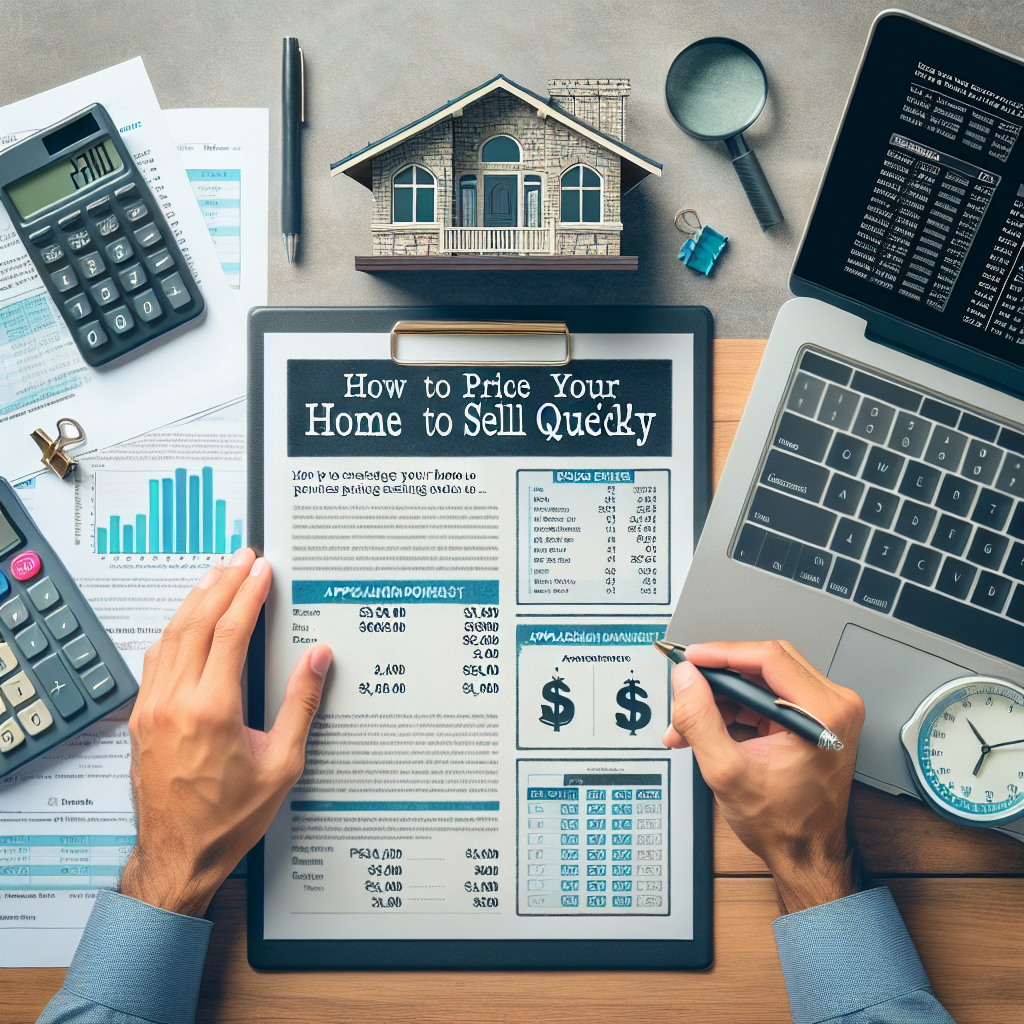Research Your Local Market
Understand the Neighborhood
When it comes to selling your home, understanding your local neighborhood is absolutely crucial. Trust me, there are subtle nuances that can really affect your home’s value. For example, homes in the vicinity of good schools tend to fetch higher prices. Or maybe the proximity to parks or shops makes your home more appealing. I always encourage sellers to take a drive around the area to observe what’s going on. What’s selling? What’s not? This info is gold.
It’s also helpful to check out online resources like Zillow or local real estate websites to get a feel for current listings in your area. Pay attention to the asking prices and how long they’ve been on the market. If you’re seeing similar homes selling for a price that makes your stomach churn, it might be time to rethink your strategy.
Finally, don’t forget to talk to your neighbors! They might have insights or even experiences that could shed light on pricing strategies that work. Word of mouth can be a powerful tool, and if you play your cards right, you might even get a referral for a great real estate agent.
Analyze Recent Sales
Digging into recently sold homes in your area can provide a reality check and set your expectations. This kind of analysis involves more than just looking at list prices; it requires a dive into what homes actually sold for. People often use this “sold prices” metric to estimate the real value of their own property. You’d be surprised how much you can learn by simply comparing similar properties.
Focus on homes that are comparable—same size, similar features, and ideally, in the same neighborhood. This will provide the groundwork you need when setting your own price. Once you have those figures in front of you, you’ll start to see patterns emerge. For instance, if homes with a certain number of bedrooms sell much faster, that gives you a clue!
Lastly, don’t just look at the sales from the last month. Go back as far as six months to a year if the market is stagnant; things can change rapidly, and you want to be informed about trends, not just data points. Understanding the rhythm of your market will allow you to make smarter, more informed decisions.
Leverage Online Tools
In today’s tech-savvy world, there are a plethora of online tools that can help you price your home effectively. Websites like Realtor.com, Redfin, and Zillow provide property assessments based on algorithms that analyze past sales and current listings. While I wouldn’t suggest banking entirely on these estimations, they can serve as a useful starting point.
You might come across a “home value estimator” on those sites—these tools can give you an idea of where you stand compared to similar homes. However, I’ve found that a mixed approach works best! Combine what the online estimates tell you with local market knowledge, and you won’t go wrong.
Another cool resource is home appreciation calculators that can help you determine how much your home has increased in value over time. This is particularly crucial for anyone who’s lived in their house for a while. You may be pleasantly surprised at how much equity you might have built up! Understanding your home’s appreciation can help you negotiate better offers.
Consider Competitive Pricing Strategies
Set a Price That’s Attractive
Just because you think your home is worth a million bucks doesn’t mean it really is—at least not in the current market! An attractive price can draw potential buyers in, and it’s essential to make your listing stand out. One of my go-to strategies is to price just below a round number, say $399,900 instead of $400,000. This can make your listing appear more appealing in searches where buyers set their budgets below that threshold.
It’s all about creating that buzz! A well-placed price can lead to multiple offers and perhaps even a bidding war, which is what we all want, right? Trust me, the right price can mean the difference between a home sitting stale on the market for months, or selling in just a few weeks.
In my experience, pricing your home attractively can even turn a modest home into a hot commodity. Just ensure that you don’t go below your bottom line. That’s key—know where the line in the sand is for your finances so you don’t end up regretting your decision down the line.
Highlight Unique Selling Points
Your home likely has features that make it one-of-a-kind, and that should definitely factor into the pricing strategy. If you’ve got recent renovations, a killer view, or a spacious yard, you need to highlight those elements to justify a higher price point. It’s not just about square footage; it’s about livability!
As a marketer, I understand the importance of creating a compelling narrative around the property. When potential buyers can visualize themselves in a home because of its unique offerings, they’re more likely to fall in love and pay what you’re asking. So, don’t be shy about boasting a bit!
Lastly, I recommend talking to your agent about doing a comparative analysis of similar homes with and without those unique features. This data can back you up if you decide to price on the higher end of your range.
Don’t Let Emotions Cloud Your Judgment
It’s easy to get attached to your home—after all, it’s filled with memories! However, those emotions can cloud the judgment when it comes to pricing. As hard as it is, you need to think like a businessperson rather than a homeowner. Understand that buyers are going to look at your property impartiality.
Keep in mind, the market doesn’t care about your feelings! Stick to the hard data and numbers we talked about earlier, and don’t let nostalgia sway your pricing decisions. Price psychology is real, and the sooner you recognize that, the better your chances of selling quickly.
If you’re really struggling with this aspect, consider working closely with a good real estate agent who can help guide you through the process. Their job is to protect your interests, and they can offer you the objective perspective you may need.
Seek Professional Assistance
Choose a Knowledgeable Real Estate Agent
A savvy real estate agent can be worth their weight in gold when it comes to pricing your home. They have access to market data and insights that you might not, as well as years of experience to guide you through the pricing labyrinth. I always advise sellers to interview multiple agents before making a choice—get a feel for their approach, ask about their communication style, and see which one you click with.

https://Credit411USA.com
An excellent agent will provide a comparative market analysis (CMA), which will help you understand how similar homes in your neighborhood are priced. A good agent won’t just play nice; they’ll give you the straight talk about what buyers are currently looking for. It’s key to find someone who understands your market.
Also, don’t hesitate to ask your chosen agent for testimonials from previous clients. It’s always a good idea to know that you’re working with someone who has a proven track record and the chops to negotiate on your behalf.
Consider Hiring a Professional Appraiser
If you really want to get an accurate gauge on your home’s value, consider hiring an independent appraiser. They carry authority and their assessment can help you establish a fair price based on various factors. Unlike local agents who may be biased or motivated to list at a certain rate, an appraiser’s job is to give you a straightforward market-based evaluation.
Appraisals recognize the subtle distinctions in your property, such as its condition, location, and any improvements you’ve made. In my experience, having an appraisal done can bolster your negotiation position with buyers, as it substantiates your asking price.
Plus, if your home does happen to appraise higher than anticipated, that could give you a nice upper hand in negotiations. You might even have the chance to push the price a touch higher if multiple buyers show interest.
Evaluate Market Conditions
Market conditions can fluctuate like the wind, so it’s pivotal to be aware of what’s happening at the moment you decide to sell. Are you in a buyer’s market with lots of competition, or is it a seller’s market where homes are flying off the shelves? This will guide how you price your home. For instance, in a hot market, you might set your price slightly above comparable sales, while in a cooler market, even competitive pricing might not be enough.
Keep a close eye on interest rates, as these can have a huge impact on buyer behavior. If rates are low, buyers may be more willing to pay a bit extra. Conversely, if rates are climbing, they may hesitate to put all their eggs in one basket. Recognizing these trends can empower you to make informed decisions.
Lastly, be prepared to adjust your pricing strategy based on feedback from the market. If you’re seeing lots of viewings without offers, or if feedback points to your price being higher than buyers are willing to pay, it might be time to revisit your numbers.
Prepare for Negotiations
Be Ready for Counteroffers
Once you list your home, prepare yourself for the back-and-forth that often accompanies any negotiation. It’s kind of like a dance, so be ready to lead and follow as required. Remember, a counteroffer doesn’t mean an insult to your initial asking price; it’s part of the game. People often feel comfortable going lower when they’re genuinely interested. Expect that, and don’t take it personally!
One of the best ways to play this negotiation game is to remain calm and collected, while knowing what your bottom line is. You really don’t want to end up in a situation where you feel pressured to take less than you’re comfortable with. Settle on an amount you’re willing to accept before negotiations start so there are no surprises.
Also, maintain open lines of communication with your agent during this phase. They can provide invaluable advice on how to respond to each offer while keeping your emotional state in check. Having professional guidance can make all the difference when juggling multiple offers or counteroffers.
Stay Flexible
Flexibility can be your best friend when pricing your home. If you’ve received feedback that your price point is a touch high, don’t dig in your heels and hold fast. Understand that market feedback is critical; being too rigid could mean your home sits unsold while others in the area fly off the market.
It might be worth considering incentives to close the deal. Offering to pay a portion of closing costs or leave behind some of your appliances can make your listing a lot more appealing without needing to drop the price significantly. This helps communicate that you’re keen to sell without undermining your listed price.
Lastly, if emotions are running high during negotiations, remember to step back and take a breath. Sometimes, taking a short break or re-evaluating can provide renewed perspective. Market dynamics shift quickly, so staying nimble and open to change encourages a better negotiating environment.
FAQs
1. How do I know if my home is priced correctly?
You can gauge your home’s pricing accuracy by conducting a comprehensive research of your local real estate market. Look at recent sales of comparable properties, use online valuation tools, and consult with a knowledgeable real estate agent who can provide a CMA (Comparative Market Analysis).
2. What if I don’t agree with my agent’s pricing suggestion?
If you disagree with your agent’s suggested price, have an open discussion. Present your findings, and ask them to explain their rationale. Sometimes having a dialogue can help both parties arrive at a mutually agreeable price.
3. Should I lower my price if there are no offers?
If you haven’t received any offers after a reasonable time on the market, it may be worth considering a price adjustment. However, also take into account feedback from potential buyers and your agent’s insights before making changes.
4. How does the season affect home pricing?
Seasonal fluctuations can play a significant role in home pricing. Generally, spring and summer tend to be more favorable for selling, as families want to move during the warmer months. In contrast, winter may see slower activity and less competition, which could influence how you price your home.
5. How can I make my listing more attractive without lowering the price?
To enhance your listing’s attractiveness without lowering the price, focus on professional staging, high-quality photos, and a strong online marketing strategy. You could also offer incentives like covering closing costs to sweeten the deal without compromising your asking price.

https://Credit411USA.com

